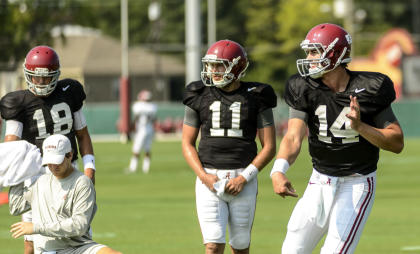SEC's shootout days could ground to a halt in 2014

HOOVER, Ala. – The Southeastern Conference's brief identity crisis may be over.
For the past two seasons – and especially in 2013 – a league built on fast and ferocious defense played touch football. Offenses ruled like never before. Scoreboards exploded. Shootouts proliferated.
Fans raised on 17-14 slobberknockers weren't quite sure how to react. Pat Dye surely thought the end of democracy was at hand. Bear Bryant must have gone through three packs of Chesterfields in Gridiron Heaven watching Alabama surrender 42 to Texas A&M and 34 to Auburn.
This is a conference that has produced the national statistical champion in scoring defense 21 times (including five times this century) and in scoring offense only twice (last time in 1996). Yet with a plethora of talented and experienced quarterbacks, a greater embrace of hurry-up offense and a lot of vulnerable defenses, the formerly rock-ribbed SEC closely resembled the Big 12.
Last year SEC teams averaged more points per game (31.7) and more yards per game (432.5) than at any time since at least 1992, when the conference expanded to 12 teams. SEC defenses also allowed the most points (24.8) and yards (379.8) since '92. (Interestingly in a pass-first era, there also were the most rushing yards produced and allowed in 2013, but not the most passing yards produced and allowed. That happened in 2001.)

Texas A&M's defense allowed the most yards in school history. Georgia's surrendered the most points per game in school history. Traditional powers Alabama, LSU and Florida had their weakest defenses in several years.
Now it is time for the SEC to return to its defensive roots. Perhaps less by choice than by necessity.
The offensive turnover is dramatic. The conference lost its top five quarterbacks in pass efficiency, top five receivers in yards per game and top two running backs in yards per game. Among the departed are a Heisman Trophy winner (Johnny Manziel), two Heisman finalists (AJ McCarron and Tre Mason), the SEC's all-time passing leader (Aaron Murray) and four top-12 NFL draft picks from the offensive side (linemen Greg Robinson and Jake Matthews, receivers Mike Evans and Odell Beckham).
Exactly one quarterback who threw for more than 2,000 yards in 2013 (Mississippi's Bo Wallace) returns in '14. There are zero returning 1,000-yard receivers. There are some excellent running backs, but the overall lack of returning skill-position star power is noteworthy.
"Some guys are going to have a chance to make a name for themselves," said Georgia coach Mark Richt.
The opportunities are out there. For Jacob Coker, the untested probable starting quarterback at Alabama (for all of Nick Saban's incredible recruiting, quarterback has been an exception). For Hutson Mason at Georgia, finally getting the QB job full-time as a fifth-year senior. For Dylan Thompson, a backup no longer at South Carolina, and Jeff Driskel, healthy and in a user-friendly offense at Florida. For whoever emerges in the quarterback battles among inexperienced candidates at A&M, LSU, Kentucky and Vanderbilt.
"It's an unknown quantity of guys," Richt said. "You don't know exactly what's going to happen with these guys. I wouldn't say that the quarterback play is going to be down. We'll just have to wait and see."
While we're waiting to see, expect a lot of handoffs. This could be a highly conservative league once again. Six of the seven SEC teams ranked in the USA Today preseason top 25 would seemingly feel better about their running game than their passing game at present, and that's undoubtedly true of several unranked SEC teams as well.
So if you're scouring for Heisman candidates from the SEC, start with the runners: Todd Gurley from Georgia; Mike Davis from South Carolina; T.J. Yeldon and a cast of thousands at Alabama; maybe even hotshot LSU freshman Leonard Fournette, if he can get enough carries while sharing time with two veteran teammates. That extends to running quarterbacks like Nick Marshall at Auburn and Dak Prescott at Mississippi State. There doesn't figure to be a lot of 40-pass-attempt games for SEC QBs this year.

Coaches love playmakers at quarterback, but they love non-mistake-makers even more. This was the stat quoted by Florida coach Will Muschamp earlier this month: "My three years at Florida, we've been 19-3 when we won or tied the turnover margin. We've been 3-13 when we've lost the turnover margin."
In an effort to win turnover margin, expect a very conservative September in a lot of SEC locales. Until coaches know they can trust their young quarterbacks, they're not going to place the weight of the world on their shoulder pads.
"I think every quarterback has to go through sort of a process of development because three things that are critical factors to me at quarterback," Alabama's Nick Saban said. "Decision making and judgment is a critical factor, accuracy with the ball is a critical factor, and leadership is a critical factor. Two out of three of those things are a little bit innate in terms of a guy understanding a system, feeling confident in application of that system so they can make good choices and decisions, can lead, can be accurate, to enhance the players around him. That's the challenge with a young quarterback.
"How long is it going to take that guy to go through that process? How long is it going to take him to where he can do those things effectively and gain the respect of his teammates and have an effect on them so that you play well together as a unit? I think that's the biggest challenge. …The development of that position, regardless of who the player is, is going to be critical to the success of our team."
Saban speaks for much of the SEC when he says that. This will be a more cautious, defense-first conference in 2014 – which is to say, a return to what made the league great in the first place.


